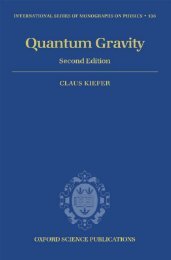Three Roads To Quantum Gravity
Three Roads To Quantum Gravity
Three Roads To Quantum Gravity
You also want an ePaper? Increase the reach of your titles
YUMPU automatically turns print PDFs into web optimized ePapers that Google loves.
MANY OBSERVERS, NOT MANY WORLDS<br />
45<br />
language. But this one world contains many different, equally<br />
consistent histories, each of which can be brought into being<br />
by the right set of questions. Each history is incompatible<br />
with the others, in the sense that they cannot be experienced<br />
together by observers like ourselves. But each is, according to<br />
the formalism, equally real.<br />
As you might imagine, there was a huge, if mostly friendly,<br />
disagreement over what to make of this. Some of us follow Fay<br />
Dowker and Adrian Kent in their conviction that this in®nite<br />
expansion of the notion of reality is unacceptable. Either<br />
quantum mechanics is wrong when applied to the whole<br />
universe, or it is incomplete in that it must be supplemented<br />
by a theory of which set of questions corresponds to reality.<br />
Others follow James Hartle and Murray Gell-Mann in embracing<br />
the extreme context dependence that comes with their<br />
formulation. As Chris Isham says, the problem lies with the<br />
meaning of the word `is'.<br />
If this were not trouble enough, there are other dif®culties<br />
with this conventional formulation of quantum cosmology.<br />
It turns out that one is not free to ask any set of questions:<br />
instead, these are constrained by having to be solutions to<br />
certain equations. And, although we had solved the equations<br />
that determine the quantum states of the universe, it<br />
proved much more dif®cult to determine the questions that<br />
can be asked of the theory. It seems unlikely that this can<br />
ever be done ± at least in any real theory, as opposed to the<br />
toy models that describe little yo-yo-like versions of the<br />
universe. Perhaps I should not comment on the likelihood of<br />
®nding the right set of questions, given that our solving the<br />
equations for the states was itself a total accident. Still, we<br />
have tried, many smarter people have tried, and we have all<br />
come to the conclusion this is not a stone that can be<br />
moved. So conventional quantum cosmology seems to be a<br />
theory in which we can formulate the answers, but not the<br />
questions.<br />
Of course, from the perspective of the last chapter, this is<br />
not surprising. We saw there that to formulate a theory of<br />
cosmology we must acknowledge that different observers see<br />
partly different, partial views of the universe. From this


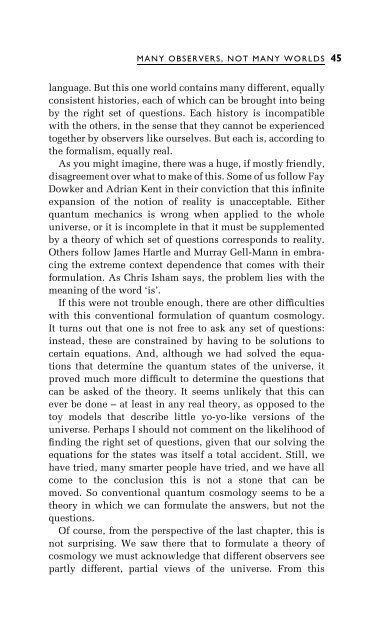
![arXiv:1001.0993v1 [hep-ph] 6 Jan 2010](https://img.yumpu.com/51282177/1/190x245/arxiv10010993v1-hep-ph-6-jan-2010.jpg?quality=85)
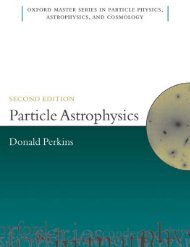
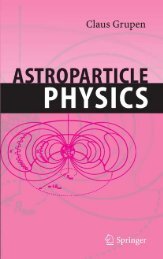
![arXiv:1008.3907v2 [astro-ph.CO] 1 Nov 2011](https://img.yumpu.com/48909562/1/190x245/arxiv10083907v2-astro-phco-1-nov-2011.jpg?quality=85)
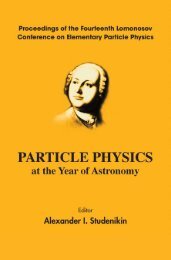
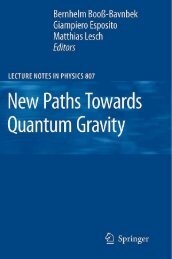
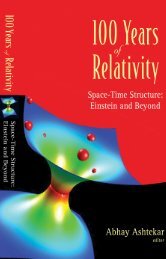
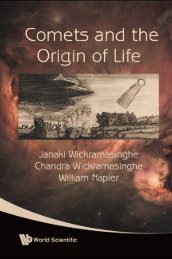
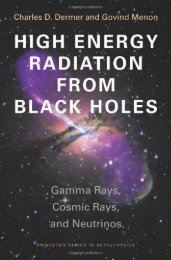
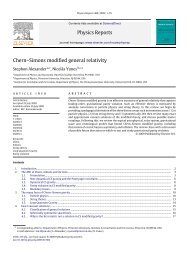
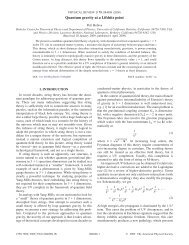
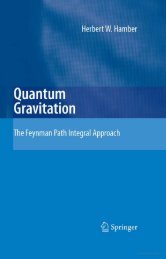
![arXiv:1002.4928v1 [gr-qc] 26 Feb 2010](https://img.yumpu.com/41209516/1/190x245/arxiv10024928v1-gr-qc-26-feb-2010.jpg?quality=85)
![arXiv:1206.2653v1 [astro-ph.CO] 12 Jun 2012](https://img.yumpu.com/39510078/1/190x245/arxiv12062653v1-astro-phco-12-jun-2012.jpg?quality=85)
